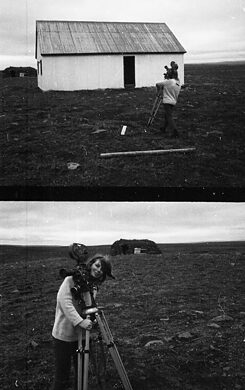|
6:00 PM
FIGURES OF ABSENCE: THE FILMS OF DORE O.
Film Screening|Book Launch and Film Screening
-
Goethe-Institut London, London
- Price £5, concession £3, free for Goethe-Institut language students and library members, booking essential

Please find more information about Dore O., the book and the event below.
Book tickets through Eventbrite
Programme Details
Please arrive at the start times of either part of the programme sections if you cannot come to the whole programme.
6.00pm - 7.30pm: Book Launch
A screening of Frozen Flashes by Dore O. will be followed by “Retracing the Films of Dore O. and Women’s Experimental Cinema”, a discussion between Masha Matzke (Film restorer/scholar, Deutsche Kinemathek, Berlin) and Lucy Reynolds (CREAM, University of Westminster). Based on Lucy Reynolds’s essay “Variable Exposures: Finding Feminism and the Uncanny in FROZEN FLASHES,” Matzke and Reynolds will discuss Dore O.’s contribution to an international continuum of radical film art in relation to the legacy, reception, and marginalisation of women’s experimental cinema.
FROZEN FLASHES (1976, 29 Min., DCP)
Dore O.: "Lightning strikes the square of dreams out of the darkness."
7.30pm - 8.15pm: Break (Beverages will be provided)
8.15pm - 10.15pm: Film Programme + Q&A with Anthony Moore
Marking the London premiere of the restorations, the programme focuses on hypnotic image-sound relations and is followed by a Q&A with composer Anthony Moore, who provided the soundtrack for several of Dore O.’s films.
ALASKA (1968, 18 min, DCP, Sound: Dore O.)
Dore O.: “An emigration film: a dream of myself, the consequences of the act with society.”
KALDALON (1971, 45min, DCP, Sound: Dore O. and Anthony Moore)
Dore O.: “A non-euclidean, ambiguously mangled and transfigured adventure film.”
KASKARA (1974, 21 min, DCP, Sound: Anthony Moore)
Dore O. : “A balance of being enclosed in divided space….The landscape exists only as a view through windows and doors…Attraction, blending, and repulsion of half of the film frame for the purpose of a sensual topology…One image consumes another.”
Running Time: 84 mins
About Dore O.
In the 1960s, the painter Dore O. (1946-2022) became one of the first and few women in Germany to turn to experimental film in such a consistent and self-determined way. She was actively involved in exploring new forms of cinema while developing her own “signature, her own tone, her own film method” (Harun Farocki). Radically following her own path, she laid the groundwork for a later generation of notably female artists by cultivating personal filmmaking in a strong intersection with medium-specific experimentation while defying highly politicised currents and prevailing theories, both structural and feminist – a refusal that rendered her work hard to categorise, ultimately pushing it to the margins. For almost 35 years, despite an overall decline in German experimental film in the 1970s, Dore O. carried on, meticulously crafting a filmic reality that is captured and experienced foremost as a sensuous and evocative flow of multilayered images and sounds, which induce a state in-between hypnosis and lucidity. Dore O. transformed painterly and musical concepts into a distinctly cinematic language, using complex in-camera editing and rephotographing techniques, rhythmic alternations between depth and surface, stillness and motion, to “create new architectures of old forms” (Dore O.). Going beyond the strictly personal or formalistic, her work thwarts those categories in its highly enigmatic and elusive poetics, by conveying new modes of introspection, states of consciousness, and vaguely evoked stories from inside the layers of celluloid film. By the 2000s, nearly her entire oeuvre from the 1960s and 70s had become inaccessible due to the poor condition of the remaining film prints. These were digitally restored in recent years at the Deutsche Kinemathek in collaboration with Dore O.
ABOUT THE BOOK
Aiming at a long-overdue reappraisal of Dore O.’s avant-garde film practice, the new publication Figures of Absence exposes the formal rigour and inventiveness as well as the cultural connotations and historical ramifications of a cinematic vision that has been relegated to the purely personal, diaristic, and even non intellectual realms. Figures of Absence features previously unpublished archival material and rare interviews with Dore O., extensive image material, as well as new contributions from international scholars and experts on women’s experimental cinema from Europe and North America, including Albert Alcoz, Ute Aurand, Robin Blaetz, Christine Noll Brinckmann, Stephen Broomer, Vera Dika, Marie-Hélène Gutberlet, Mike Hoolboom, Sarah Keller, Anthony Moore, Lucy Reynolds, Tony Reif and Maureen Turim, among others.
The book will be available at the event, at the BFI book shop, and online
About the Participants
Masha Matzke is a Berlin-based film restorer, archivist, scholar, and curator with a focus on experimental cinema at the Deutsche Kinemathek. She is the editor of the first monograph of the experimental filmmaker Dore O. (Figures of Absence. The Films of Dore O., StrzeleckiBooks).
Lucy Reynolds is a feminist writer, curator and artist. She edited the anthology Women Artists, Feminism and the Moving Image, co-edited Artists’ Moving Image in Britain since 1989 and co-edits the Moving Image Review and Art Journal (MIRAJ). She co-ordinates the PhD programme for the Centre for Research in Education, Art and Media (CREAM) at the University of Westminster. As an artist, her ongoing sound work A Feminist Chorus has been heard at the Glasgow International Festival, the Wysing Arts Centre and Grand Union galleries, Birmingham.
Anthony Moore (*1948) is a British experimental musician and producer. From minimalist composer to Pink Floyd lyricist, with many interesting stops in between, Moore contributed soundtracks to numerous experimental films (such as David Larcher’s epic Mare’s Tail). He was a founding member of the band Slapp Happy, collaborated with Henry Cow and Kevin Ayers, among others, and has made a number of solo albums, including Flying Doesn't Help (1979). Moore has focused much of his work on music and sound research and education, including serving as professor at Cologne, Germany's Academy of Media Arts.
Location
50 Princes Gate
Exhibition Road
London SW7 2PH
United Kingdom
